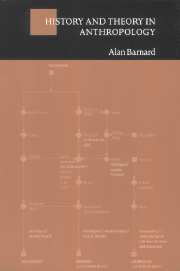Book contents
- Frontmatter
- Contents
- List of figures
- List of tables
- Preface
- 1 Visions of anthropology
- 2 Precursors of the anthropological tradition
- 3 Changing perspectives on evolution
- 4 Diffusionist and culture-area theories
- 5 Functionalism and structural-functionalism
- 6 Action-centred, processual, and Marxist perspectives
- 7 From relativism to cognitive science
- 8 Structuralism, from linguistics to anthropology
- 9 Poststructuralists, feminists, and (other) mavericks
- 10 Interpretive and postmodernist approaches
- 11 Conclusions
- Appendix 1 Dates of birth and death of individuals mentioned in the text
- Appendix 2 Glossary
- References
- Index
2 - Precursors of the anthropological tradition
- Frontmatter
- Contents
- List of figures
- List of tables
- Preface
- 1 Visions of anthropology
- 2 Precursors of the anthropological tradition
- 3 Changing perspectives on evolution
- 4 Diffusionist and culture-area theories
- 5 Functionalism and structural-functionalism
- 6 Action-centred, processual, and Marxist perspectives
- 7 From relativism to cognitive science
- 8 Structuralism, from linguistics to anthropology
- 9 Poststructuralists, feminists, and (other) mavericks
- 10 Interpretive and postmodernist approaches
- 11 Conclusions
- Appendix 1 Dates of birth and death of individuals mentioned in the text
- Appendix 2 Glossary
- References
- Index
Summary
Most anthropologists would agree that anthropology emerged as a distinct branch of scholarship around the middle of the nineteenth century, when public interest in human evolution took hold. Anthropology as an academic discipline began a bit later, with the first appointments of professional anthropologists in universities, museums, and government offices. However, there is no doubt that anthropological ideas came into being much earlier. How much earlier is a matter of disagreement, though not particularly much active debate. Rather, each anthropologist and each historian of the discipline has his or her own notion of the most relevant point at which to begin the story.
From a ‘history of ideas’ point of view, the writings of ancient Greek philosophers and travellers, medieval Arab historians, medieval and Renaissance European travellers, and later European philosophers, jurists, and scientists of various kinds, are all plausible precursors. My choice, though, would be with the concept of the ‘social contract’, and the perceptions of human nature, society, and cultural diversity which emerged from this concept. This is where I shall begin.
Another, essentially unrelated, beginning is the idea of the Great Chain of Being, which defined the place of the human species as between God and the animals. This idea was in some respects a forerunner of the theory of evolution, and later in this chapter we shall look at it in that context.
- Type
- Chapter
- Information
- History and Theory in Anthropology , pp. 15 - 26Publisher: Cambridge University PressPrint publication year: 2000



